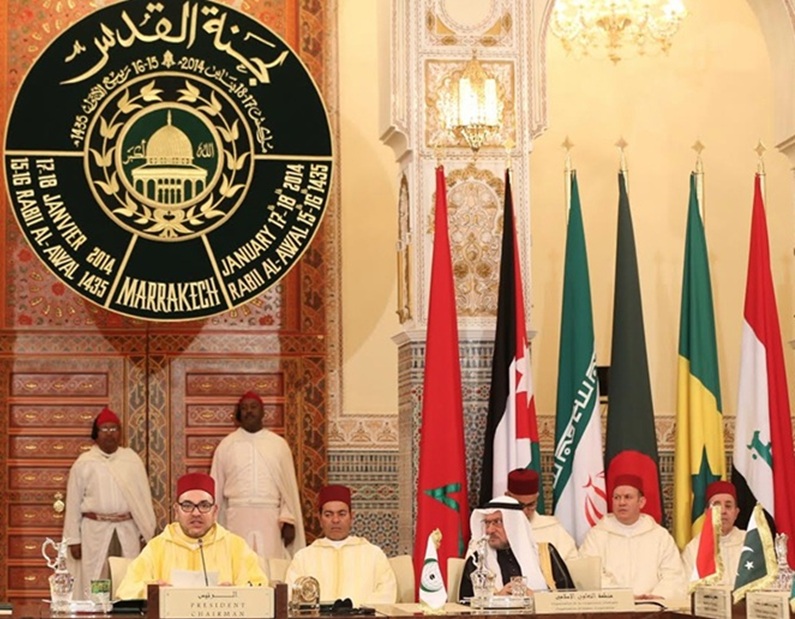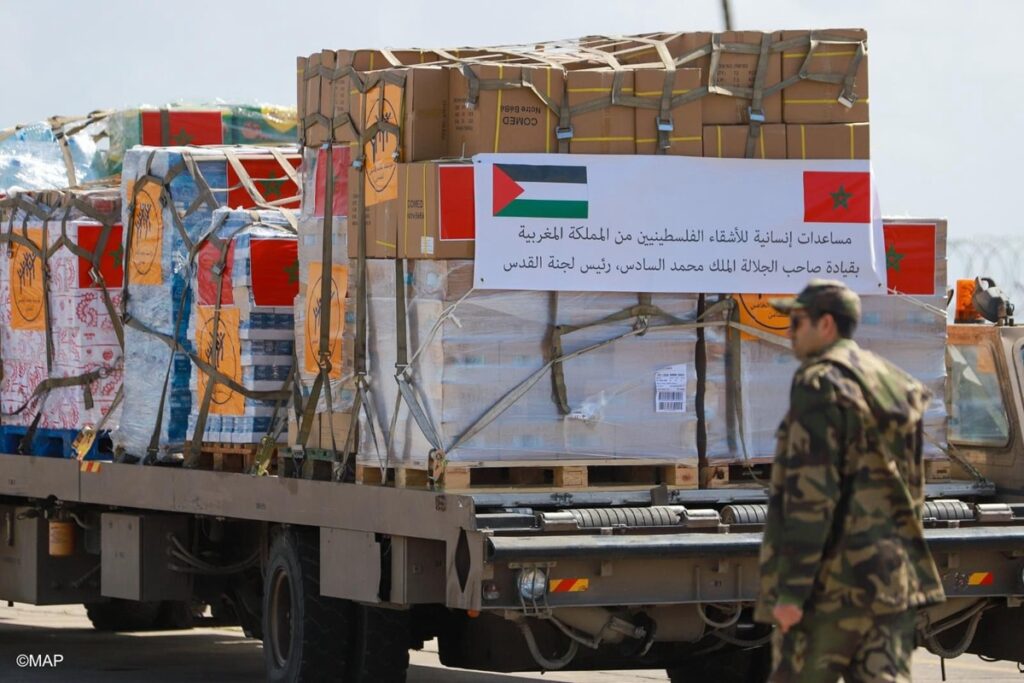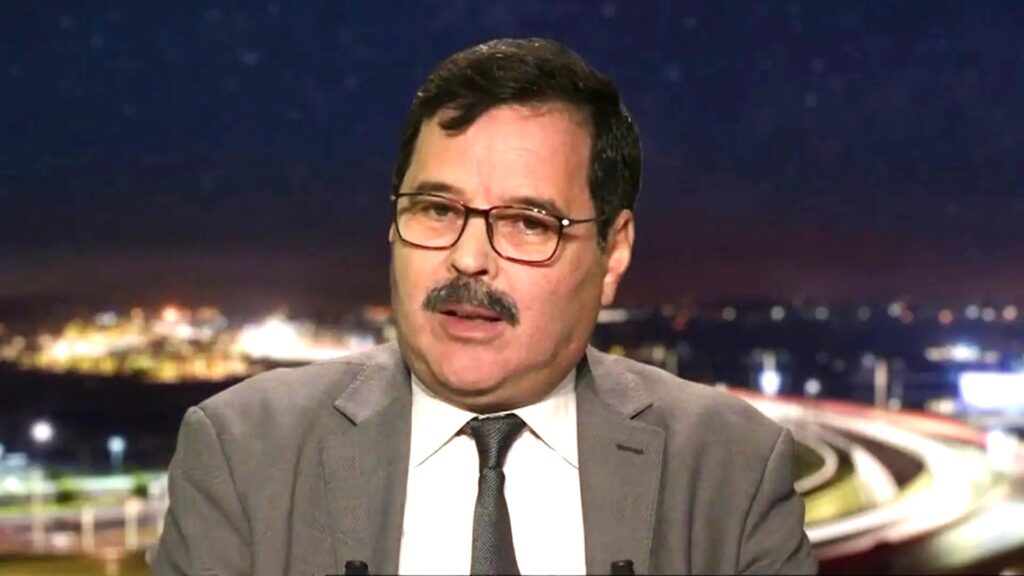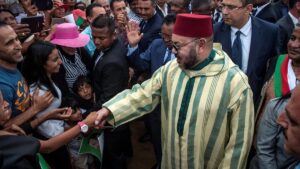In Morocco... "The Palestinian King"... with warmth of heart and insight of mind

Written by: Taleh Saud Al-Atlassi (Moroccan writer and journalist)
Over the past few days, Palestine has had a strong and distinctive presence in Morocco. The Palestinian cause, in Morocco, is a national issue, in the same vein as the issue of the Moroccan Sahara. This week is a continuation of the entire year, and of all the years of "Palestinian life" in Morocco.
In Rabat, in front of the Moroccan Parliament, a popular march was held with the participation of tens of thousands of Moroccans, in solidarity with Palestine, condemning the barbaric Israeli aggression on Gaza, and calling out against the genocide, by fire and starvation, that Israel is perpetrating against the Palestinian people of Gaza, men, women, elderly and children. It was a truly Moroccan, national march, in every sense of the word, with its orderly and calm march in the heart of Rabat and in front of the headquarters of the two houses of the Moroccan Parliament.
On the same days, the presidents of both chambers received a Palestinian political delegation, an envoy of the Palestine Liberation Organization... In both meetings, the Palestinian delegation heard strong expressions of Palestinian identity among the Moroccan people... Mr. Talbi El Alami, the Speaker of the House of Representatives, made a profoundly significant gesture by including the heads of Moroccan parliamentary groups, representing the Moroccan political fabric, in the reception of the Palestinian delegation... so that Morocco's guests could hear the profound meaning of Moroccans' view of the Palestinian cause as a national issue...
The Palestinian delegation, headed by PLO Executive Committee member Ahmed Al-Tamimi, met with high-ranking figures in Morocco, from whom it heard that the Moroccan state, as it always was, was ready to transform expressions of solidarity with the Palestinian people in their struggle for their national rights, transforming them, in the reality of Moroccan-Palestinian fraternal relations, into tangible actions, in a manner that the Palestinian state appreciates and sees fit...
Moroccan Foreign Minister Nasser Bourita informed the delegation that King Mohammed VI's instructions were to immediately respond to the Palestinian Authority's perceptions that Morocco has the potential and needs... These instructions were also observed by the delegation among other officials it met... The Minister heard from officials in the Human Rights and International Relations Departments of the Palestine Liberation Organization (PLO) the high appreciation the Palestinian Authority has for His Majesty the King of Morocco for his fruitful efforts in responding to the Authority's requests to intervene with Israel to lift the Israeli pressure on it... by releasing the "clearance" funds that Israel is withholding, to be handed over to the Palestinian Authority. This is a right it has, derived from the proceeds of commercial traffic within, from, and to the West Bank.
The Palestinian delegation also appreciated the effective royal intervention in opening the crossings for the movement of people and goods between the Palestinian territories and the world, a vital artery controlled by Israel, the most important of which is the Karameh (Limbi) crossing in Israel.
The delegation also conveyed the Palestinian leadership's gratitude to His Majesty King Mohammed VI for his efforts with Israel to halt the demolition of homes in Jerusalem, a list of which it had received as part of a Palestinian appeal.
Amina Bouayach, President of the National Council for Human Rights, responded enthusiastically to the request of the Human Rights Department of the Palestinian Organization to host a training course on human rights mechanisms for Palestinian cadres in the field. The days were intense, with presentations by Moroccan professors specializing in the intellectual, legal, and human rights pillars of human rights culture. Presentations reflect the depth and breadth of Moroccan experience in conceptual frameworks, legal construction, and practical application of human rights issues and problems.
Thirteen human rights cadres, both men and women, from several West Bank governorates benefited from the training. The training will continue over the coming years with other groups, pursuant to an agreement signed at the end of the session between the National Council for Human Rights and the Human Rights Department of the Palestinian Organization. This signifies the success of this session and its continued openness, based on the organization’s confidence in Moroccan expertise, which is now internationally recognized, as evidenced by Ambassador Omar Zniber’s presidency of the World Council for Human Rights last year, and Amina Bouayach’s current presidency of the Global Alliance of Human Rights Organizations. Most importantly, it is open within the embrace of sincere, productive, and permanent Palestinian-Moroccan patriotism, as President Bouayach expressed in her closing speech for the session, in which she combined the strongest condemnations of Israeli aggression with the warmest feelings of solidarity with the Palestinian people, and Morocco’s readiness to support their heroic steadfastness in their struggle for their national rights, and with them, their basic human rights.
With the conclusion of the “Palestinian Week” in Morocco, Bayt Mal Al-Quds was distributing tens of hundreds of food and medical baskets in and around Jerusalem, under unstable security conditions due to the escalation of the Israeli siege and house raids in the West Bank in general, including Jerusalem. This means that the operational arm of the Al-Quds Committee, headed by King Mohammed VI, does not stop working and providing humanitarian intervention in Jerusalem, throughout the year and under all circumstances. This is a clear sign of Morocco’s sincerity in supporting the Palestinian cause, in practice, and not merely through slogans that evaporate in the air and do not leave the platform from which they were launched. This is what those who neighbor Morocco do with their outbidding. They are unable to keep up with the sincerity of its Palestinian identity and its practical benefits for the Palestinian people.

King Mohammed VI's instructions to enhance interaction with the Palestinian delegation were evident in the quality of the officials who received him, and in the prospects for cooperation with the Palestinian Authority in its efforts to develop the capabilities of its institutions and frameworks to promote human rights. This is typical of a king who has infused his Moroccan identity with a high level of Palestinian identity, and given it a significant place, both rationally and emotionally, in his reform and modernization project that he has formulated for Morocco since assuming power in 1999.
Today, Moroccans celebrate Throne Day, the Accession Day as it is called in the Levant. It is a national political occasion for a public debate to appreciate the achievements of a reign led by a king who wanted a rule that would be beneficial to Morocco, with diverse and integrated reconciliations, and by laying the foundations of a renaissance in the political, social and economic structures, and by sharpening aspirations and preserving their suitability as a key to the future... Moroccans also appreciate the royal approach and its diplomatic struggle, which has gained the issue of the Moroccan Sahara this momentum of international support, weighty and overwhelming, for the legitimacy of the Moroccan right and for the peaceful proposal for an “autonomy” solution...
In the same national context, Moroccans see, and the world bears witness, that Moroccan nationalism is neither isolationist nor chauvinistic. Its soul is human, its pulse is African, its sensibilities are Arab, and its passion is Palestinian. Thus, in the “piano” of the Palestinian issue, Moroccans play with ten fingers… diverse but integrated and harmonious rhythms… its capital is Moroccan nationalism, and its guarantee is Moroccan democracy… This is embodied by King Mohammed VI, the active leader of Morocco’s historical leadership, as he places the Palestinian cause in a position of human interaction with it and approaches it with political realism, adhering to its essence and nourishing it with productive and ongoing action… It is not a compliment to him to be called, in one of the possibilities of being called “the Palestinian King”… because he places Palestine in the space connecting his mind and heart… since the Palestinian people, while suffering the most horrific pain… at the same time possess the largest global human reserve of hope…






